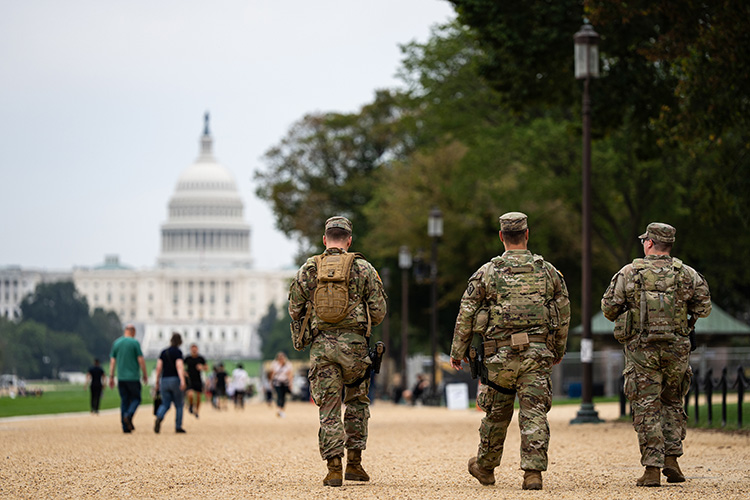New York Correspondences / Political and Geostrategic Observatory of the United States
6 October 2025
The Strategy of Fear: Trump Militarises America, City by City

After deploying the National Guard in Los Angeles this summer—although there was clearly no need for it—and then in Washington, where, as I have already written in these pages, one can now come across tanks when leaving Union Station, Donald Trump has just ordered the deployment of 300 National Guard soldiers in Portland, Oregon. A federal court has temporarily blocked this decision, but the message has been delivered: the militarisation of America continues methodically, Democratic city after Democratic city.
All of this follows a clear strategy: that of fear. A fear carefully cultivated within his electorate, which sees in this administration the last bulwark against an alleged “domestic terrorism” said to be ready to overwhelm the country. Trump justified his order to deploy troops in Portland by claiming that the city was ravaged by “violence worthy of a civil war,” even authorising “the use of maximum force if necessary.”
The reality? Peaceful demonstrations against the immigration police, which have been ongoing for several months—protests that are indeed loud, but that fully fall within the legitimate exercise of the right to demonstrate in a democracy.
This strategy of fear works in two directions. On one side, it reassures the Trumpian base, convinced that their president is “protecting” “authentic” America from the urban chaos of Democratic strongholds. On the other, it paralyses the opposition, each day a little more intimidated by this show of force. To see soldiers patrolling American streets to maintain order—a spectacle unseen for half a century—has a devastating psychological impact on many who might still be tempted to oppose the government’s excesses.
This staging had in fact been hinted at during that surreal meeting a few days ago before senior military officers, where Trump spoke incessantly of war, even though he is, as we know, viscerally opposed to any large-scale foreign intervention. Those bellicose declarations had a single aim: to justify not external interventions, but deployments of the National Guard on American soil. Unprecedented.
And now, the Democratic opposition is taking an immense risk by triggering a government shutdown of indefinite duration, fully aware that the Republicans will not give an inch.
Their protest is understandable: nearly 30 million Americans will soon be joined by around 13 million more on the list of those without health insurance, as a result of Donald Trump’s measures to dismantle Obamacare. This principled opposition to the presidential budget is morally irreproachable—how can such a wealthy country accept condemning 43 million of its citizens to live without medical coverage?
But this shutdown is dangerous. Each passing day, each unpaid civil servant, each suspended social benefit will be blamed on the Democrats at the ballot box. And Trump, for his part, will not miss the opportunity: he will take advantage of this paralysis to dismiss thousands of civil servants, turning a political crisis into an administrative purge. All this will be unfairly pinned on the Democrats by a public opinion that, for the most part, does not grasp the subtleties of budgetary battles—but fully feels their immediate consequences in daily life.
The Democrats are right on substance, but their fight may quickly become sterile. For the sake of the country’s functioning, they should perhaps—temporarily—now that they have made their point, stand down, allow the government to reopen, and resume the struggle on other fronts: the courts, the media, and public opinion. That is where their voice must be heard, not in a dead-end power struggle that benefits only the executive.
They should also give their full support to the governor of California, Gavin Newsom, in his crusade against the growing authoritarianism embodied in these successive deployments of the National Guard. For if a federal judge has been able to temporarily block the one in Portland, how long will the last safeguards of the rule of law hold out against an administration that is multiplying pressures on the judicial system?
The fact that Trump also authorised the deployment of the National Guard in Chicago, only hours after immigration officials claimed to have clashed with protesters, perfectly illustrates this strategy of permanent escalation. Every incident, every demonstration, becomes a pretext for a new show of force.
We are witnessing the systematic establishment of an authoritarian state, where the armed forces—since it was indeed the US Army that was deployed alongside the National Guard in Los Angeles—become an instrument of internal control rather than external defence. This normalisation of military presence in American streets, presented as necessary in the face of a fantasised internal enemy, constitutes one of the most alarming signs of the profound transformation the American democracy is undergoing under this administration.
Each new deployment makes the next one easier, more acceptable, more “normal.” And when the presence of the army in our cities becomes the norm rather than the exception, the very nature of our society is irreversibly transformed.
The question is no longer whether Donald Trump and his heir JD Vance will continue down this path—they have made it perfectly clear that they will—but whether the opposition will finally find a strategy to resist them effectively without falling into the traps set for it. Time is running out, for each passing day normalises the unacceptable a little more.
Romuald Sciora directs the Political and Geostrategic Observatory of the United States at IRIS, where he serves as an Associate Research Fellow. A Franco-American essayist and political scientist, he is the author of numerous books, articles, and documentaries, and regularly comments on current affairs in international media. He lives in New York.

